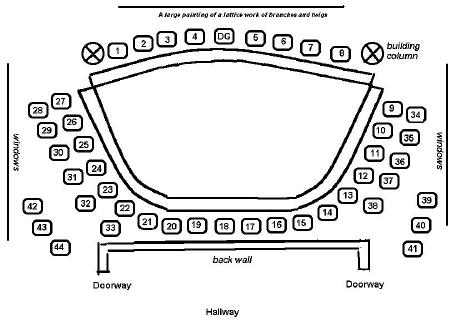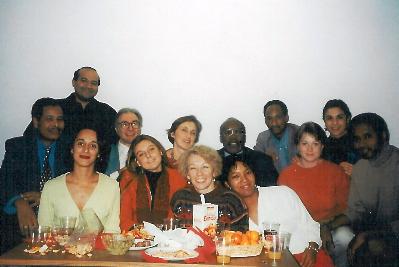Stories
UN Declaration and Programme of Action for a Culture of Peace
Personalities in the "culture of peace bed"
I call this the "second inquisition" because I think of the 11-12 December 1990 meeting at the Guggenhiem Foundtion in New York as the "first inquisition."
This one took place on 2 April 1998. It was all theatre!
It began at 5:00 in the afternoon and went on and on until 8:00, as the light faded, in the direction générale of UNESCO Fontenoy, a small semi-circular room modeled in some respects after the throne rooms of medieval europe.

The direction générale - click on figure to enlarge
At the front of the room, where the Director-General would normally "hold court", flanked by his top cabinet, sat the Culture of Peace Director Leslie Atherley [chair 3] and a team of three professional mediators [chairs 4-DG-5] from the Centre de Mediation, headed by my good friend Jacqueline Morineau. Jacqueline thought so highly of me and the culture of pece that she had volunteered their services when she heard about the conflict in the Culture of Peace Programme,
Ranged in a semi-circle facing the mediators were all of the members of the culture of peace unit. I was on one side, alone, at about [12}. On the other side, ranging from [17-24] were the Leslie's secretary Jeanine Harter and staff members Miriam Karela, Edouard Matoko, Ingeborg Breines and Mirta Lourenco, Matoko's secretary Vicki Moorhead and my secretary Saida Doumba. I don't recall if Zeynep Varoglu or Manuel Caldera were there.
For two and a half hours, as the sun set and the room grew dark because we had no lighting, Jeanine and Miriam led the attack against me, accusing me of destroying the culture of peace program in all manner of ways. And for two and a half hours, the mediators mirrored the attacks back to the attackers with phrases such as "You say that David types his own memos and that undermines your authority as the unit secretary." and "You say that David has gone behind Leslie's back and spoken with the Director-General." etc., etc.
And for two hours, I remained silent, listening to the frustrations of UNESCO staff members who had believed in the culture of peace program and now blamed me for its failures. Much of the attacks were personal, as they had grown to dislike me as the American who had originally developed the program, but had increasingly recognized that it was failing. And much of the frustration came simply from the programme's failure.
Not a single person came to my defense, directly or indirectly. Leslie, manipulated by Jeanine and Miriam, kept his silence. Ingeborg, hoping to benefit by taking over the program on Leslie's retirement, kept silent. Edouard, who previously had refused to come to Saida's defense when she was attacked by the others, did not come to my defense either. He, too, was ambitious. And poor Saida, who had been physically attacked by the others for refusing to help them sabotage my work, was in no position to speak.
In truth, the culture of peace programme - and in particular its national programmes - had been destroyed by the rich member states who refused to fund it, even more than the bureaucracy of UNESCO which could not make it work. A year and a half before in December 1996, I had made an analysis of the failure of the programme which I entitled "Lessons drawn from failures of the Culture of Peace Programme 1993-1995", but I had shown the analysis to nobody. There was nobody to listen. Not even the Director-General wanted to hear the bad news, and certainly my colleagues did not.
It was a lonely time. I was ready to quit. But instead I conceived of the Culture of Peace News Network, proposed it to the Director-General, and received responsibility for the International Year for the Culture of Peace.
Once I left the Culture of Peace Programme, its disintegration accelerated, and by the time of the International Year for the Culture of Peace, it had been disbanded.
Looking back on that theatrical evening, I see how the great forces of history ultimately get played out on the stage of personalities and scenes, where often we fail to understand their significance.
 |
Stages
1982-1986
American Peace Movement
1986-1992
Seville and Peoples Peace Appeal
1992-1997
UNESCO Culture of Peace Programme
